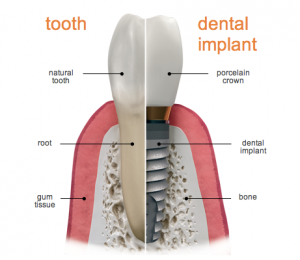Implants are the best choice for people who want long-term tooth replacement. How long does a dental implant last? Factors affecting how long they will last depend largely on the lifestyle of the patient and their overall dental hygiene.
The technology has become advanced over the years to the point that implant failures as a result of functionality issues or rejection have largely come to be problems of the past. The factors that are more likely to result in an implant failure include implant misuse, diseases and pre-existing medical conditions.


Components
To understand fully how long they last, let us first lay out the 3 key components:
Implant – It’s a titanium post that’s surgically placed in your jawbone, and it acts as the root for your crown.
Abutment – It’s attached to the implant, plus it holds the crown making sure it is in place.
Crown – It’s a ceramic tooth fastened to the abutment; it provides a natural tooth appearance.
Generally, the crown and the exposed abutment are more prone to damage than the implant itself.
When you maintain them properly with flossing and adequate brushing, the implant itself will last a lifetime, assuming that you receive regular dental check-ups two times per year. However, a crown is estimated to last around 10-15 years before the usual wear can cause your tooth to need replacement, but excellent dental hygiene can extend the life beyond fifteen years. Also, mouth location is a factor in the longevity that is expected. Implants that are in the back of your mouth often receive more strain while you are chewing, causing them to fail faster than implants that are near the front of your mouth.
Dental Implants Versus Other Tooth-Placement Options
They are designed to be a solution that is permanent for missing teeth, and it has come to be the standard tooth-replacement option. Unlike dentures, they provide sufficient support, acting as a natural tooth, plus they can withstand chewing or biting without slipping. Since the implant is attached to your interior jaw bone, it isn’t subject to decay and does not put stress on your adjacent teeth: both of them are common issues with dental bridges.
Factors That Can Cause Implants to Fail
They usually provide long-term, indefinite sustainability if you properly care for them. However, various factors may cause implants to fail prematurely. People suffering from a pre-existing medical condition (like cancer or diabetes) have a greater risk of experiencing failure.
Dental implants, just like natural teeth, should be maintained through regular flossing and brushing. Poor home-care can result in periodontal disease (gum disease) in severe cases, which is another factor that can impede success.
Complications
Complications are usually rare and resolved easily, but they still occur. Even with the high 95% success rate, complications of teeth implants include the following:
• Infection around the implant area, an implant falls out or loose implant.
• Nerve or tissue damage causing numbness, tingling or pain in your natural teeth, gums, lips or chin.
• Pressure on the implant area, which could cause the implant to fail or fall out.
• Peri-implantitis – The surrounding bone plus gum becomes inflamed because of excessive biting force or bacterial infection. If left untreated, this condition can cause the patient to lose their implant.
• Sinus issues due to implants getting into contact with the sinus cavities if the implants are placed in the upper jaw.
You should follow routine maintenance care after receiving this treatment plus follow-up with your dentist so that you can avoid the aforementioned issues.
During the procedure, your dentist will examine your soft and hard tissues and then use special tools to remove hard, calcified deposits accumulating around your implant. If necessary, your dentist may adjust your bite to avoid heavy biting force, which could impact your implant negatively.
It can take a few months for the whole healing process of the implant surgery because the bone must heal firmly around the implant. The healing time takes longer if the patient needs a bone graft procedure or they’ve got an infection in the root of their tooth.
However, with correct care, dental implants can last you a lifetime!




